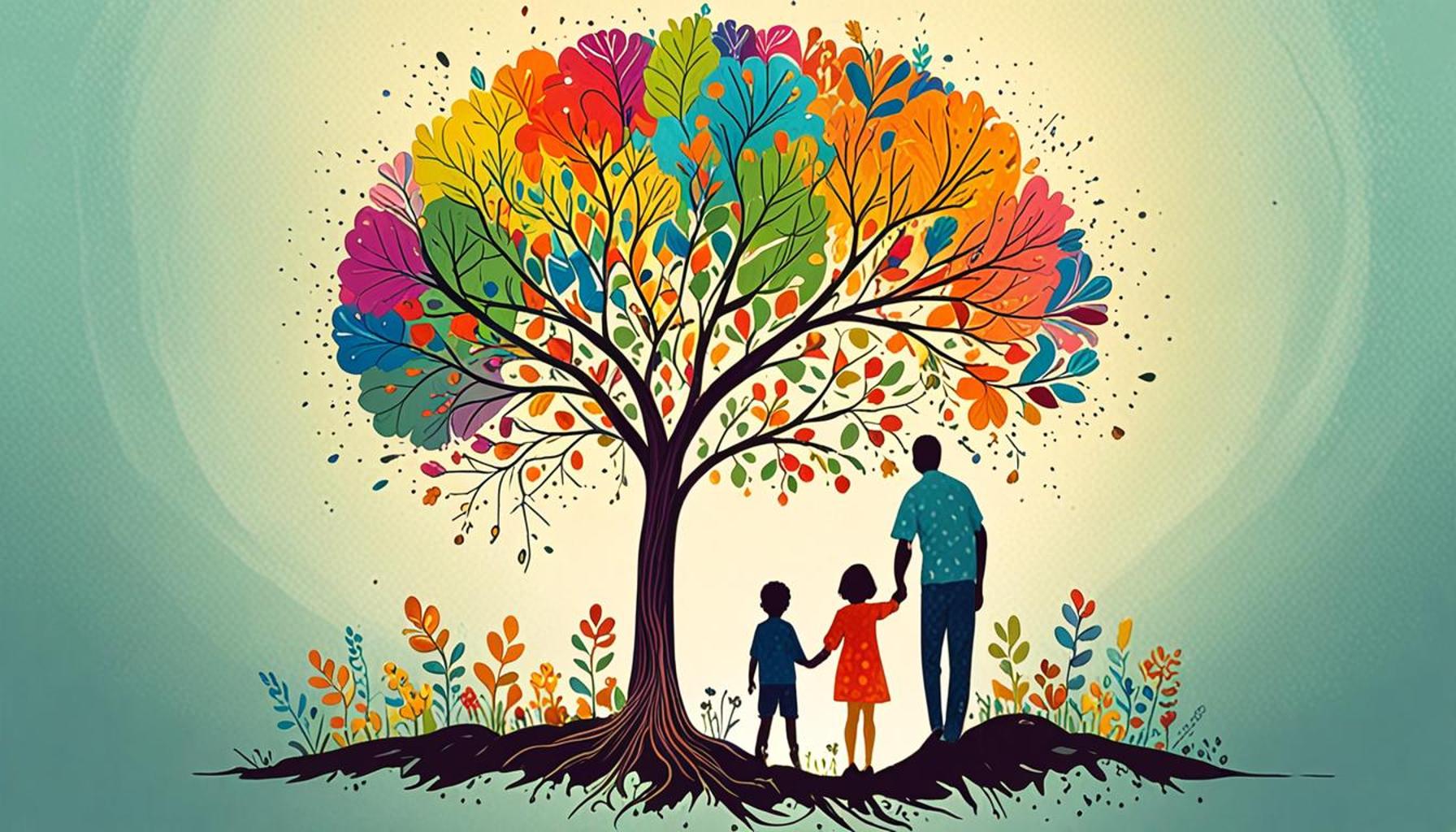Resilience Practices for Parents: Cultivating a Growth Mindset in Family Relationships

Understanding Resilience and Growth Mindset in Family Dynamics
In an increasingly complex and sometimes chaotic environment, family resilience stands as a pillar of strength, allowing families to not only survive but thrive. Resilience involves the capacity to adapt and grow in the face of adversity, a necessity for families navigating the multifaceted challenges of modern life, especially in Nigeria where socio-economic factors can impact daily routines.
What does a growth mindset involve? Adopting a growth mindset encourages individuals to view challenges as opportunities for improvement. This perspective shifts focus from merely innate talent to the importance of hard work, persistence, and learning from setbacks. For many families in Nigeria, understanding and implementing these principles can be especially transformative as they face the realities of both urban hustle and rural constraints.
Core Practices for Resilience
- Encouraging open communication: Creating an atmosphere where all family members feel comfortable sharing their thoughts and emotions is crucial. This can be practiced through regular family meetings where children and parents discuss their feelings openly and respectfully, fostering deeper connections.
- Setting realistic expectations: Families need to recognize that failure and mistakes are an integral part of growth. Parents can teach their children that it’s okay to stumble, helping them to develop a culture that values progress and learning over perfection.
- Modeling resilience: Children often learn by observing their parents. When parents encounter setbacks—whether it’s a job loss, a failed business venture, or personal struggles—they have the opportunity to model how to recover and learn from these experiences, thus instilling resilience in their children.
Building a growth mindset through these practices not only benefits the parents but also equips children with indispensable skills for navigating life’s hurdles. For instance, a child who learns to view challenges as opportunities will approach academic difficulties or conflicts with peers with a problem-solving attitude rather than defeatism.
The Nigerian Context
As we delve into these resilience practices, it’s important to acknowledge the unique challenges faced by families in Nigeria. Factors such as economic disparity, cultural expectations, and educational disparities can shape family dynamics significantly. Integrating resilience into everyday parenting is particularly important in this context, as it promotes not just individual development but collective family growth, ultimately leading to a stronger societal fabric.
By consciously adopting these practices, families can cultivate environments that not only prioritize emotional well-being but also encourage a spirit of adaptability and learning. A family that thrives together can become a cornerstone of a supportive community, offering insights and strength to others, thus creating a ripple effect that enhances the overall resilience of families in Nigeria.
In conclusion, by actively nurturing resilience and a growth mindset within family relationships, parents not only nurture their children but also empower them to contribute positively to society, ensuring that the next generation is equipped with the tools needed to face the future with confidence.
LEARN MORE: This related article may interest you
Essential Resilience Practices for Parents
When it comes to fostering resilience and a growth mindset within family relationships, parents play a pivotal role. The capacity to cultivate these qualities begins at home and is woven into the fabric of daily life. In Nigeria, where families often contend with financial instability and societal pressures, instilling a growth mindset can be especially beneficial. Below are some essential practices that parents can adopt to build resilience and encourage a proactive approach to life’s challenges.
Fostering an Environment of Acceptance
Acceptance of diversity is crucial in nurturing a growth mindset. Parents should strive to create a home where differences in thought, learning styles, and emotional responses are not only accepted but celebrated. For instance, a parent might encourage a child who struggles with mathematics to try different learning methods or seek additional support without stigma. This approach fosters a sense of belonging and reassurance that effort is valued over inherent ability.
Implementing Collaborative Problem-Solving
Engaging children in collaborative problem-solving fosters critical thinking and resilience. Instead of styling themselves as authoritative figures solely dispensing solutions, parents can involve their children in the decision-making process regarding challenges that arise. For example, when faced with budgeting issues for a family outing, parents can sit down with their children to brainstorm ideas that align with their financial parameters while still ensuring a fun experience. This not only teaches children money management skills but also nurtures teamwork and resourcefulness.
Celebrating Effort and Progress
Another important practice is to celebrate effort and progress rather than just outcomes. Parents might focus on a child’s hard work during a tough school project rather than solely evaluating the final grade. By recognizing the journey involved in achieving goals, children learn that persistence is a valuable trait. In Nigeria’s hyper-competitive educational system, this can be particularly refreshing, as it shields children from the pressure of needing to be perfect and fosters a healthier approach to academic challenges.
Encouraging Healthy Risk-Taking
Healthy risk-taking can be a powerful avenue for building resilience. Parents should encourage children to venture beyond their comfort zones, whether trying out for a new sports team or auditioning for a school play. This approach not only bolsters self-confidence but also helps children learn to manage the anxiety that often accompanies new experiences. In a culture that sometimes prioritizes safety and conformity, encouraging exploratory behavior can help children embrace life’s uncertainties with courage.
By incorporating these resilience practices into family life, parents can significantly influence their children’s developmental trajectories. The synergy of open dialogue, collaborative solutions, recognition of effort, and healthy risk-taking creates an atmosphere ripe for growth, fostering children equipped to tackle the complexities of their future. As families in Nigeria continue to navigate the challenges of their unique social landscapes, instilling these values will undoubtedly engender not only individual success but also collective strength.
| Advantage | Explanation |
|---|---|
| Strengthening Communication | Cultivating a growth mindset enhances open dialogue among family members, leading to better understanding and empathy. |
| Encouraging Resilience | By focusing on learning from mistakes, families can foster resilience in children, equipping them with skills to handle challenges effectively. |
The advantages of adopting resilience practices within family dynamics are profound. Strengthening communication is particularly essential; when parents model a growth mindset, they encourage their children to express themselves openly without the fear of judgment. This sets the stage for deeper family connections and mutual respect.Furthermore, encouraging resilience through focused discussions about failures and successes helps instill a sense of determination. Parents can share stories of overcoming obstacles, thereby teaching children that setbacks are part of growth. As a result, children learn to embrace challenges, which lays a strong foundation for their future endeavors.The benefits extend beyond individual family members, enriching the entire family relationship and leading to a more harmonious home environment. To explore how specific practices can be implemented effectively, one might consider techniques like reflective listening and consistent feedback. These strategies not only support emotional intelligence but also contribute to a thriving and supportive family culture.
RECOMMENDED: Check out this similar article
Building Emotional Intelligence in Children
In the quest to cultivate a growth mindset, building emotional intelligence (EI) becomes paramount. Emotional intelligence refers to the ability to recognize, understand, and manage one’s emotions and the emotions of others. For parents in Nigeria, especially within cultural contexts that may sometimes stifle open emotional expression, encouraging EI can significantly enhance resilience. This can begin with parents modeling emotional awareness, allowing children to observe how to navigate feelings during challenging moments. For example, discussing a day when things didn’t go as planned—be it a job loss or a family conflict—and articulating the emotions felt can provide children with examples of healthy emotional processing.
Practicing Mindfulness Together
Incorporating mindfulness practices into daily routines serves as another powerful tool for parents to enhance emotional resilience. Mindfulness can include activities such as meditation, deep-breathing exercises, or even mindful walking. For instance, a family can set aside 10 minutes each day to engage in a simple breathing exercise together. Not only do these practices reduce stress, but they also equip children with skills to stay grounded in the face of adversity. Research shows that regular mindfulness practice can improve focus and emotional regulation, enabling children to react thoughtfully rather than impulsively when challenges arise.
Setting Realistic Expectations
Parents can also play a crucial role in nurturing resilience through setting realistic expectations for their children. Instead of imposing ideals of perfection, parents can help children understand that making mistakes is a fundamental part of learning. This can be reinforced by sharing personal stories of failure and recovery. For instance, a parent might discuss their own challenges in professional contexts, sharing how perseverance and learning from mistakes led to eventual success. Acknowledging that growth often occurs through struggle can help children cultivate an appreciation for the process and reduce their fear of failing.
Creating Opportunities for Reflection
Encouraging children to engage in reflection about their experiences helps them internalize lessons learned from both successes and setbacks. Family discussions can be facilitated around specific situations. After a family event, parents might ask children what went well, what could have gone better, and how they would approach similar situations in the future. This process teaches children to analyze and learn from experiences while developing critical thinking skills necessary for resilience.
Cultivating Strong Support Networks
Finally, a vital aspect of resilience is the presence of strong support networks. In Nigeria, where community bonds are often emphasized, parents can teach their children the value of building and maintaining supportive relationships. Encouraging children to reach out to friends, family members, or mentors during times of need reinforces the idea that seeking help is a sign of strength rather than weakness. Participating in community activities like volunteering or joining local support groups can further enhance social connections, instilling a sense of belonging and security in children.
By implementing these practices, parents can carve out a path that not only fosters resilience but also deepens the familial bond. The interplay of emotional intelligence, mindfulness, realistic expectations, reflection, and community support creates an environment where children can thrive. As families navigate the challenges of contemporary Nigerian society, these resilience practices will be instrumental in preparing the next generation for the complexities of life.
YOU MAY ALSO LIKE: Read read another article
Conclusion
In navigating the intricate landscape of parenting in Nigeria, the importance of resilience practices cannot be overstated. By cultivating a growth mindset within family relationships, parents lay the groundwork for their children to face life’s challenges with confidence and determination. Through the integration of emotional intelligence, mindfulness, realistic expectations, regular reflections, and the development of strong support networks, families foster a nurturing environment that encourages personal growth and resilience.
As parents engage in open dialogues about emotions, practice mindfulness together, and share their own stories of perseverance, they instill a sense of security and understanding in their children. This supportive atmosphere not only empowers children to embrace failures as learning opportunities but also equips them with the emotional tools necessary to handle adversity. Moreover, recognizing the value of community bonds can further fortify the familial structure, teaching children the significance of seeking help and forming meaningful relationships.
Ultimately, these resilience practices serve as critical pillars, helping families thrive through the complexities of contemporary life. By focusing on these strategies and remaining committed to fostering growth, parents can raise a generation capable of navigating obstacles and embracing life’s journey with optimism. As we continue to explore the potential of nurturing robust family dynamics, it becomes clear that resilience is not just a trait—it’s a skill that, when cultivated, will shape the futures of our children.



